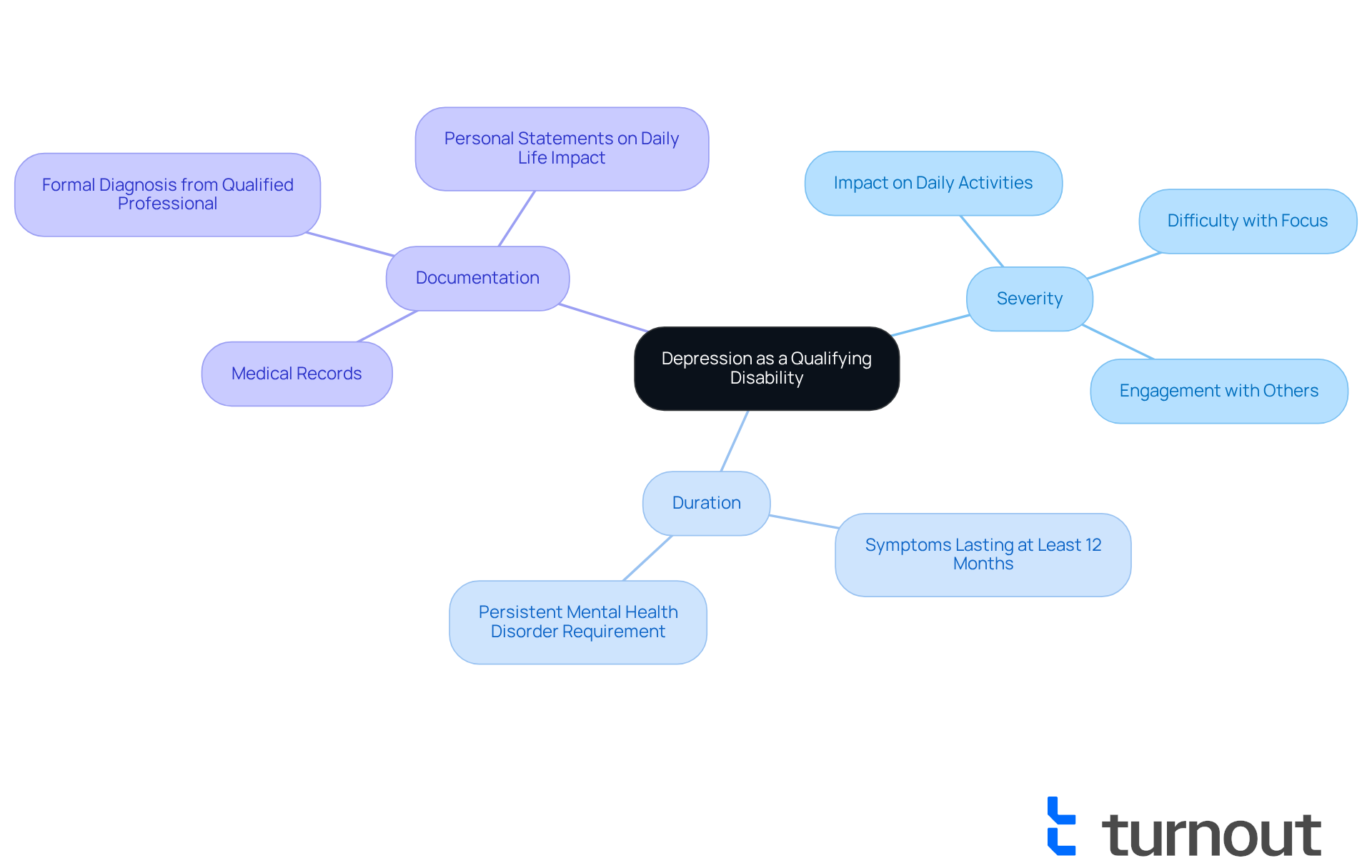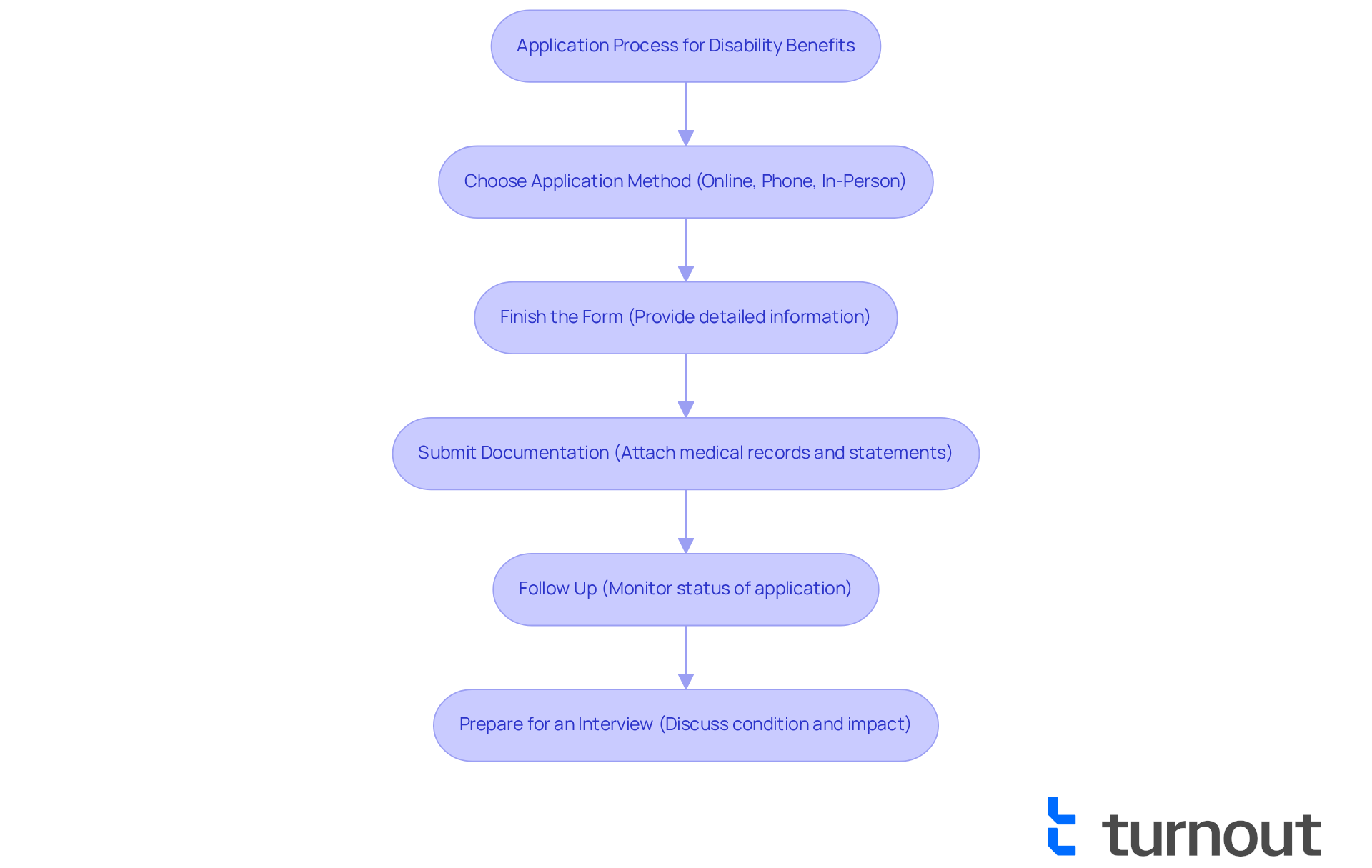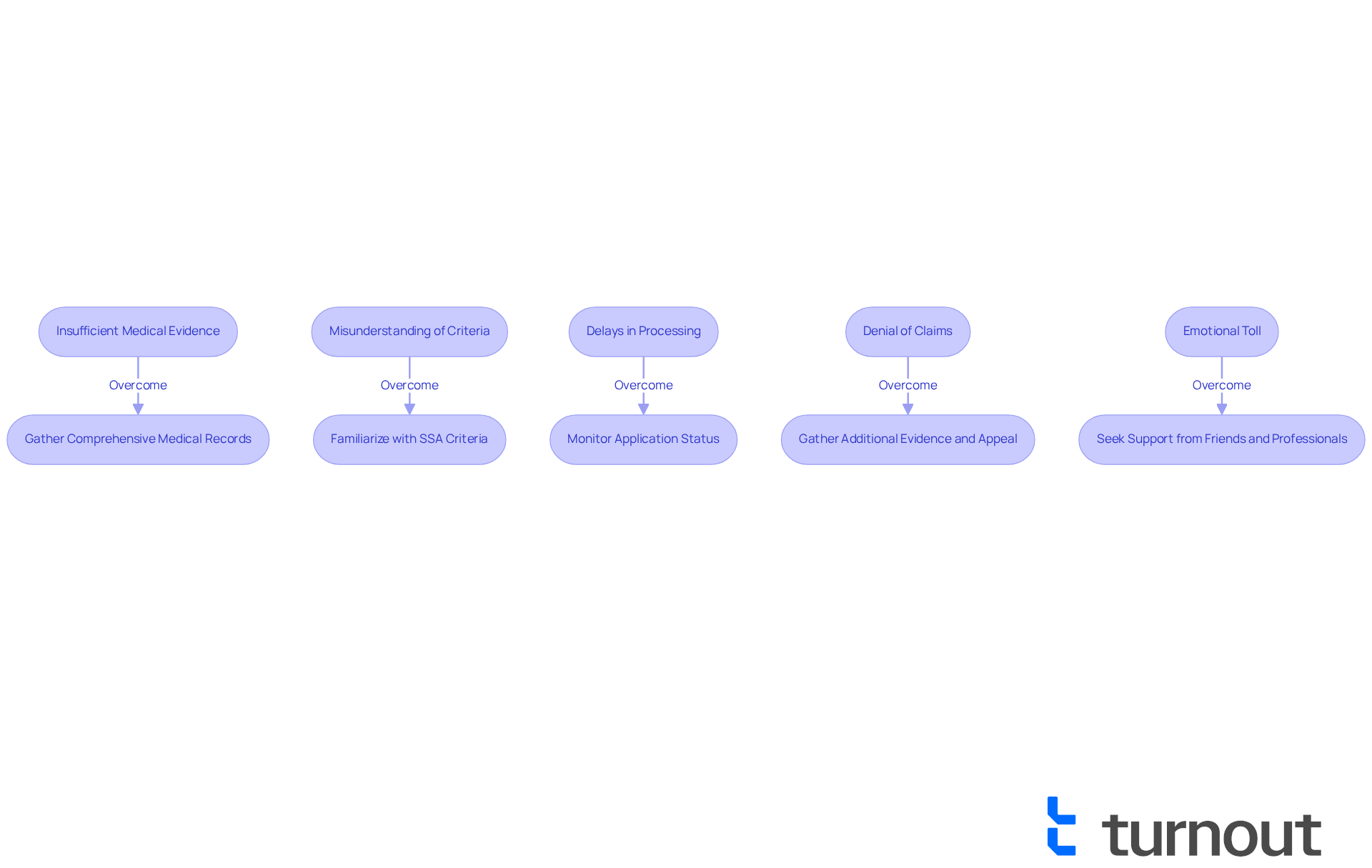Overview
We understand that navigating the process of qualifying for disability benefits due to depression can feel overwhelming. If your condition significantly limits your ability to function in daily life and work, you may be eligible for assistance as outlined by the Social Security Administration (SSA) criteria. It's crucial to document the severity and duration of your symptoms, as well as provide medical records that illustrate how depression affects your daily activities.
By detailing these aspects, you not only strengthen your application but also ensure that your struggles are recognized. Remember, you are not alone in this journey. Many have faced similar challenges and found the support they needed. We encourage you to take the steps necessary for a successful application, as this can lead to the help you deserve.
Introduction
Understanding the complexities of mental health can indeed feel daunting. When navigating the world of disability benefits, especially for those grappling with depression, the question of eligibility for support can be overwhelming. We understand that this journey can be challenging, and this guide aims to demystify the process. It offers valuable insights into the criteria and documentation needed to secure disability benefits for depression.
However, it’s common to feel discouraged, especially with the staggering number of claims denied each year. What steps can you take to enhance your chances of approval? Together, we will explore the hurdles that lie ahead and the supportive actions you can take to overcome them. Remember, you are not alone in this journey.
Understand Depression as a Qualifying Disability
According to the Social Security Administration (SSA) guidelines, one may wonder, can I get disability for depression, as it can indeed be classified as a qualifying disability. We understand that navigating mental health challenges can be overwhelming, and it's important to know that help is available. To qualify, your mental health condition must significantly hinder your ability to perform daily activities and work. The SSA assesses mental disorders, including sadness, according to specific criteria detailed in their Blue Book.
Key factors include:
- Severity: Your depression must be severe enough to limit your ability to function in a work environment. It's common to feel that intense sadness can lead to difficulties with focus, engaging with others, and managing everyday responsibilities.
- Duration: Symptoms must persist for at least 12 months. This long-term nature is crucial, as the SSA requires evidence of a persistent mental health disorder lasting at least two years to qualify for benefits.
- Documentation: A medically documented history of your condition is essential. It's vital to supply significant medical documentation, including treatment records and personal statements that explain how mood disorders impact your daily life and work abilities. A formal diagnosis from a qualified doctor or psychologist is also necessary to validate the condition.
Grasping these criteria is the initial step in determining if I can get disability for depression related to mental health issues. In 2025, the SSA continues to stress the significance of comprehensive documentation. Did you know that requests for depression have a 97% success rate when individuals undergo the process with professional support? Individuals who utilize professional services, such as those provided by Turnout , which is not a law firm, have a 50% higher likelihood of receiving benefits. Turnout employs skilled non-legal advocates who can assist you in navigating the SSD application process effectively.
It's important to maintain comprehensive records of how symptoms influence your daily activities, as this documentation can greatly affect the outcome of your request. Remember, it's also vital to be mindful that requests may be rejected if the SSA believes you can still perform in a position despite your mental health issues, leading many to wonder, can I get disability for depression? You are not alone in this journey; we're here to help you every step of the way.

Gather Required Documentation and Meet Eligibility Criteria
Applying for disability benefits due to mental health issues can feel overwhelming, especially when you're asking, 'can I get disability for depression,' but we're here to help guide you through the process. Collecting thorough documentation is essential to illustrate the severity and impact of your condition. Here’s what you need to gather:
-
Medical Records: Start by obtaining records from your mental health professionals, including psychiatrists and psychologists. These should detail your diagnosis, treatment history, and any prescribed medications. Comprehensive medical records are the foundation of your case, so make sure they are complete.
-
Treatment History: Document all treatments you have undergone, such as therapy sessions, medications, and hospitalizations. It's important that this history reflects ongoing treatment for at least two years, as required by the Social Security Administration (SSA), to determine if can I get disability for depression.
-
Personal Statements: Write a personal statement that describes how feelings of sadness impact your daily life and ability to work. Include specific examples of limitations you face, like difficulties in concentrating, social interactions, or managing daily tasks. Remember, personal statements can positively affect the outcome of disability requests, including whether you can get disability for depression, making them a crucial part of your application.
-
Functional Reports: Complete forms that assess your ability to perform daily activities and work-related tasks. The SSA provides an Adult Function Report that can help detail how your condition affects your functionality.
-
Support Letters: Collect letters from family members, friends, or coworkers who can attest to how your depression impacts your life. These testimonials can provide further context and support for your claim.
Ensure that all documentation is current and accurately reflects your condition. This thorough preparation can significantly improve your submission, especially when considering how claims backed by comprehensive and well-documented evidence can help answer the question, 'can I get disability for depression?'. To qualify for benefits, you must demonstrate extreme limitations in one area or marked limitations in two areas, such as understanding, interacting with others, concentrating, or managing oneself.
It's common to feel anxious about the process, especially since it can be prolonged, often requiring 3 to 5 months for a decision. Many initial submissions are rejected, and if you lack sufficient medical evidence, the SSA may require a consultative examination to clarify your diagnosis and functional limitations. Remember, you are not alone in this journey, and with the right preparation, you can navigate this process with confidence.

Navigate the Application Process for Disability Benefits
Navigating the application process for disability benefits can feel overwhelming. We understand that this journey may bring up many emotions, but following these steps can simplify your experience:
-
Choose Your Application Method: You have options to apply online through the SSA website, by phone, or in person at your local SSA office. Submitting online is often the quickest approach, typically taking about two hours to finalize with the help of SSA personnel.
-
Finish the Form: When filling out the form, provide detailed information about your medical condition, work history, and how depression impacts your daily life to help assess if can I get disability for depression. It's essential to be meticulous, as approximately 43% of initial submissions were rejected due to technical issues in 2021.
-
Submit Documentation: Be sure to attach all required documentation, including medical records and personal statements, to substantiate your request. Strong medical documentation can significantly enhance your chances of approval, as applicants with comprehensive records are three times more likely to succeed.
-
Follow Up: After sending your request, monitor its status. You can check online or contact the SSA for updates. The average wait time for a decision has increased to about seven months and fifteen days, so staying informed is crucial.
-
Prepare for an Interview: In some cases, you may need to attend an interview. Be ready to discuss your condition and its impact on your life. Many applicants find that being open and honest during this process can lead to better outcomes.
Turnout is here to support you through this process, utilizing trained nonlawyer advocates who can help you navigate your SSD claims effectively. By following these steps and utilizing Turnout's support, you can ensure that your submission is complete and sent accurately, enhancing your likelihood of approval. Remember, persistence pays off; many applicants who initially faced challenges ultimately received their benefits after appealing their decisions. As one successful applicant noted, 'Staying organized and proactive made all the difference in my journey.' You are not alone in this process—let us assist you every step of the way.

Overcome Challenges in the Disability Application Process
Navigating the application process for disability benefits can be fraught with challenges, especially when individuals ask themselves, can I get disability for depression, and we understand how overwhelming it may feel. Here are some common obstacles you might encounter, along with effective strategies to help you overcome them:
-
Insufficient Medical Evidence: Many requests are denied due to inadequate medical documentation. To strengthen your case, gather comprehensive records from all healthcare providers involved in your treatment. Consistent treatment and detailed reports from mental health professionals can significantly bolster your claim.
-
Misunderstanding of Criteria: It’s common for applicants to misinterpret the Social Security Administration's (SSA) criteria for disability. Familiarize yourself with the specific requirements for depression as outlined in the SSA Blue Book. Understanding how your symptoms impact daily functioning is crucial for meeting these criteria.
-
Delays in Processing: The procedure can be lengthy, leading to frustration. Stay proactive by routinely monitoring the status of your request and following up with the SSA if needed. Being informed can help mitigate anxiety during this waiting period.
-
Denial of Claims: If your claim is denied, don’t lose hope. Many individuals face multiple denials before achieving a favorable outcome. You have the right to appeal the decision. Gather additional evidence, such as updated therapy records or statements from healthcare providers, and consider seeking assistance from a disability advocate to strengthen your appeal.
-
Emotional Toll: The procedure can be emotionally taxing. Seek support from friends, family, or mental health professionals to help you cope with the stress of applying for benefits. Engaging with support groups can also provide valuable resources and encouragement.
By being aware of these challenges and preparing accordingly , you can enhance your chances of a successful application for disability benefits. Remember, you are not alone in this journey, and we’re here to help you every step of the way.

Conclusion
Understanding the path to securing disability benefits for depression is crucial for those who find themselves struggling with this mental health condition. We understand that the journey may be complex, but recognizing that depression can qualify as a disability under the Social Security Administration’s guidelines empowers you to seek the support you need. By grasping the eligibility criteria, documentation requirements, and application process, you can take informed steps toward obtaining the benefits you deserve.
Throughout this guide, we have addressed key points, including:
- The importance of severity and duration of symptoms
- The necessity of comprehensive medical documentation
- The various challenges faced during the application process
It’s essential to highlight the significance of detailed personal statements and functional reports, as well as the value of professional support. Thorough preparation is vital to enhance the likelihood of approval.
Ultimately, the significance of understanding and addressing the complexities of applying for disability benefits due to depression cannot be overstated. It is imperative to remain proactive, gather necessary documentation, and seek assistance when needed. For those navigating this journey, remember that support is available, and persistence can lead to success in overcoming obstacles. Taking the first step toward securing benefits can feel daunting, but with the right resources and guidance, a brighter path toward mental health support is within reach.
Frequently Asked Questions
Can I get disability for depression?
Yes, depression can be classified as a qualifying disability according to the Social Security Administration (SSA) guidelines, provided it significantly hinders your ability to perform daily activities and work.
What are the key factors that the SSA considers for depression to qualify as a disability?
The SSA considers the severity of your depression, the duration of symptoms (which must persist for at least 12 months), and the documentation of your condition, including treatment records and a formal diagnosis from a qualified doctor or psychologist.
How severe does my depression need to be to qualify for disability?
Your depression must be severe enough to limit your ability to function in a work environment, affecting your focus, engagement with others, and management of everyday responsibilities.
How long do my symptoms need to last to qualify for disability benefits?
Symptoms must persist for at least 12 months, and the SSA requires evidence of a persistent mental health disorder lasting at least two years to qualify for benefits.
What type of documentation is required to support my disability claim for depression?
You need to provide significant medical documentation, including treatment records, personal statements explaining how mood disorders impact your daily life and work abilities, and a formal diagnosis from a qualified healthcare professional.
What is the success rate for disability claims related to depression?
Requests for depression have a 97% success rate when individuals undergo the process with professional support.
How can professional support help with my disability application?
Utilizing professional services, such as those provided by Turnout, can increase your likelihood of receiving benefits by 50%. They employ skilled non-legal advocates to assist you in navigating the SSD application process effectively.
Why is it important to maintain records of how my symptoms affect daily activities?
Comprehensive records of how your symptoms influence your daily activities are crucial, as they can greatly affect the outcome of your disability request.
What might happen if the SSA believes I can still perform work despite my mental health issues?
If the SSA believes you can still perform in a position despite your mental health issues, your request for disability benefits may be rejected.




